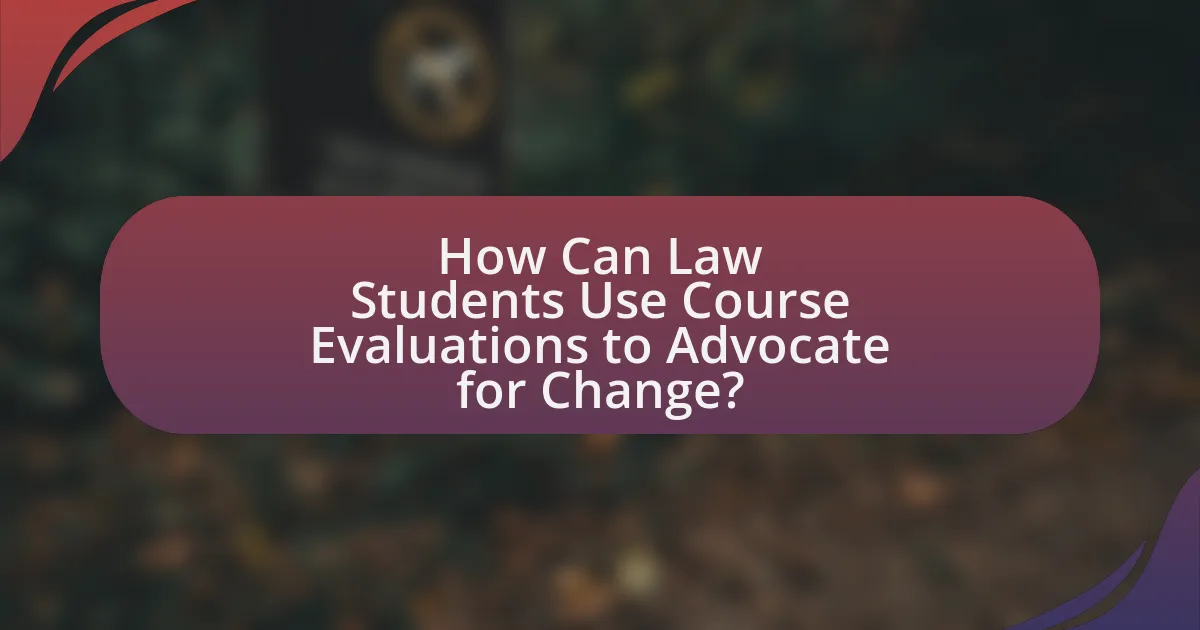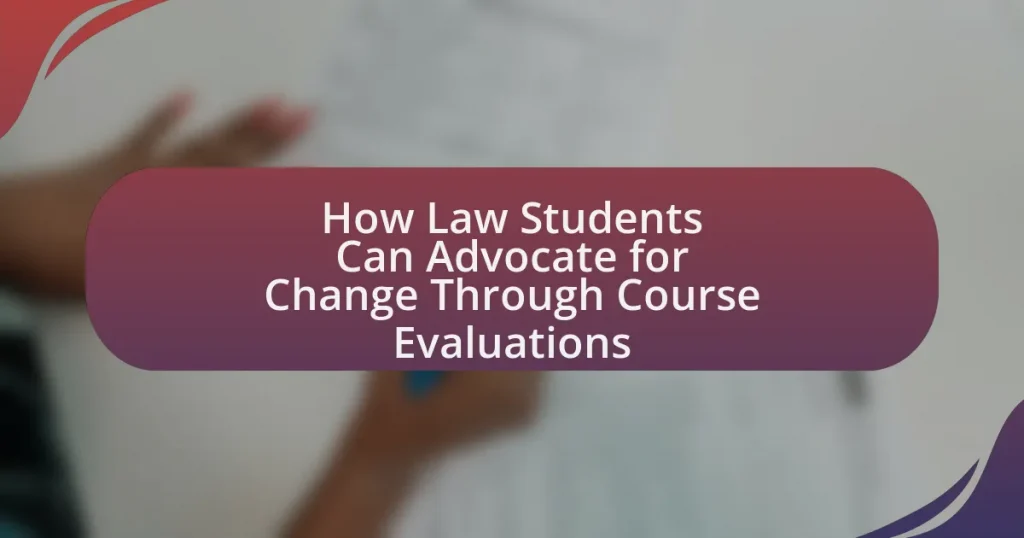The article focuses on how law students can effectively advocate for change through course evaluations. It outlines the purpose of course evaluations in law schools, emphasizing their role in enhancing educational quality, influencing curriculum development, and assessing faculty performance. The article discusses the importance of advocacy for law students, detailing strategies for providing constructive feedback, addressing specific issues, and overcoming challenges such as fear of retaliation. Additionally, it highlights the significance of collaboration among students and the impact of student organizations in amplifying advocacy efforts, ultimately aiming to foster a more responsive and effective learning environment.

How Can Law Students Use Course Evaluations to Advocate for Change?
Law students can use course evaluations to advocate for change by providing constructive feedback that highlights areas needing improvement within their curriculum and teaching methods. By systematically documenting their experiences and suggestions in evaluations, students can identify specific issues such as outdated materials, ineffective teaching styles, or lack of diversity in course content. Research indicates that when students articulate their concerns clearly, faculty and administration are more likely to take action; for example, a study published in the Journal of Legal Education found that student feedback directly influenced curriculum revisions in several law schools. This demonstrates that well-articulated evaluations can lead to tangible changes in educational practices.
What are Course Evaluations and Their Purpose in Law Schools?
Course evaluations are systematic assessments conducted by law schools to gather feedback from students regarding their courses and instructors. The primary purpose of these evaluations is to enhance the quality of education by identifying strengths and weaknesses in teaching methods, course content, and overall student satisfaction. Research indicates that effective course evaluations can lead to improved teaching practices and curriculum development, ultimately benefiting both students and faculty.
How do Course Evaluations Impact Curriculum Development?
Course evaluations significantly influence curriculum development by providing direct feedback from students regarding their learning experiences and the effectiveness of course content. This feedback allows educators and administrators to identify strengths and weaknesses in the curriculum, leading to informed decisions about necessary adjustments. For instance, a study published in the Journal of Educational Psychology found that courses with higher evaluation scores often correlate with improved student engagement and learning outcomes, prompting curriculum enhancements that align with student needs. Thus, course evaluations serve as a critical tool for continuous improvement in educational programs.
What Role do Course Evaluations Play in Faculty Assessment?
Course evaluations serve as a critical tool in faculty assessment by providing structured feedback from students regarding their learning experiences. These evaluations help institutions gauge teaching effectiveness, identify areas for improvement, and inform decisions related to faculty promotions, tenure, and professional development. Research indicates that student feedback can correlate with student learning outcomes, making course evaluations a valuable component in enhancing educational quality. For instance, a study published in the “Journal of Educational Psychology” found that constructive student feedback can lead to improved teaching practices and student satisfaction.
Why is Advocacy Important for Law Students?
Advocacy is important for law students because it equips them with essential skills for effective legal practice and promotes social justice. Engaging in advocacy helps law students develop critical thinking, persuasive communication, and negotiation skills, which are vital in legal careers. Furthermore, advocacy fosters a sense of responsibility towards societal issues, encouraging students to use their legal knowledge to influence positive change. Research indicates that law students who participate in advocacy programs report higher levels of confidence and preparedness for their future roles as attorneys, highlighting the practical benefits of advocacy in their education.
How Can Advocacy Through Course Evaluations Influence Educational Quality?
Advocacy through course evaluations can significantly influence educational quality by providing structured feedback that highlights strengths and weaknesses in teaching methods and course content. When law students actively participate in course evaluations, they can identify specific areas for improvement, such as curriculum relevance and instructional effectiveness. Research indicates that institutions that prioritize and act on student feedback see enhanced educational outcomes, as evidenced by a study published in the Journal of Higher Education, which found that responsive changes based on evaluations led to increased student satisfaction and academic performance. Thus, law students’ advocacy through course evaluations serves as a critical mechanism for fostering continuous improvement in educational quality.
What Are the Long-Term Benefits of Student Advocacy in Law Education?
The long-term benefits of student advocacy in law education include enhanced curriculum development, improved teaching methodologies, and increased student engagement. By actively participating in course evaluations, law students provide critical feedback that informs faculty and administration about the effectiveness of courses and teaching styles. This feedback can lead to curriculum adjustments that better align with the evolving legal landscape, ensuring that students are equipped with relevant knowledge and skills. Research indicates that institutions that prioritize student feedback often see higher satisfaction rates and better academic outcomes, as evidenced by a study published in the Journal of Legal Education, which found that law schools that implemented systematic feedback mechanisms improved their overall educational quality. Additionally, student advocacy fosters a culture of collaboration and accountability within law schools, ultimately contributing to the development of more competent and socially aware legal professionals.

What Strategies Can Law Students Employ in Course Evaluations?
Law students can employ several strategies in course evaluations to effectively advocate for change. First, they should provide specific, constructive feedback that highlights both strengths and areas for improvement in the course. This approach ensures that their evaluations are actionable and focused on enhancing the educational experience. Additionally, students can use examples from their own experiences to illustrate their points, making their feedback more relatable and impactful. Research indicates that detailed feedback is more likely to lead to changes in course structure and content, as it provides instructors with clear guidance on student needs. Furthermore, students should consider collaborating with peers to gather a broader range of perspectives, which can strengthen their evaluations and present a united voice for change.
How Should Law Students Structure Their Feedback?
Law students should structure their feedback by organizing it into clear, specific categories such as strengths, weaknesses, and suggestions for improvement. This structured approach allows for a comprehensive evaluation of the course and teaching methods. For instance, identifying specific strengths, like effective communication or engaging materials, helps reinforce positive aspects, while detailing weaknesses, such as unclear assignments or lack of support, provides constructive criticism. Additionally, offering actionable suggestions, such as incorporating more practical exercises or providing clearer guidelines, can facilitate meaningful changes. This method aligns with best practices in feedback, which emphasize clarity and specificity to enhance the learning experience and promote constructive dialogue between students and faculty.
What Specific Issues Should Students Address in Evaluations?
Students should address issues related to course content, teaching effectiveness, and classroom environment in evaluations. Specifically, they should evaluate whether the course material is relevant and up-to-date, assess the clarity and engagement of the instructor’s teaching methods, and comment on the inclusivity and respectfulness of the classroom atmosphere. Research indicates that constructive feedback on these areas can lead to improvements in curriculum design and teaching practices, ultimately enhancing the educational experience for future students.
How Can Students Provide Constructive Criticism Effectively?
Students can provide constructive criticism effectively by being specific, focusing on behaviors rather than personal attributes, and offering actionable suggestions for improvement. Specific feedback helps instructors understand the exact issue, while focusing on behaviors ensures that the criticism is objective and not perceived as a personal attack. For instance, instead of saying “The lectures are boring,” a student might say, “The lectures could benefit from more interactive elements, such as group discussions or case studies.” This approach not only highlights the problem but also provides a clear path for improvement, making the feedback more valuable and likely to be acted upon.
What Are the Best Practices for Submitting Course Evaluations?
The best practices for submitting course evaluations include providing specific, constructive feedback, submitting evaluations promptly, and maintaining confidentiality. Specific feedback helps instructors understand strengths and areas for improvement, while timely submissions ensure that evaluations are considered in a relevant context. Confidentiality encourages honest and candid responses, fostering a more accurate representation of student experiences. Research indicates that detailed evaluations lead to more effective teaching adjustments, enhancing the overall educational experience.
When is the Optimal Time to Submit Evaluations?
The optimal time to submit evaluations is typically at the end of the course, after all major assignments and exams have been completed. Submitting evaluations at this time allows students to provide comprehensive feedback based on their entire experience in the course, ensuring that their insights are informed and relevant. Research indicates that evaluations submitted closer to the end of the course yield more thoughtful and reflective responses, as students can assess the course holistically rather than based on isolated incidents.
How Can Students Ensure Their Voices Are Heard?
Students can ensure their voices are heard by actively participating in course evaluations and providing constructive feedback. Engaging in this process allows students to express their opinions on teaching effectiveness, course content, and overall educational experience. Research indicates that when students provide specific, actionable feedback, it can lead to tangible changes in course structure and teaching methods, thereby enhancing the learning environment. For instance, a study published in the Journal of Educational Psychology found that student feedback significantly influenced faculty teaching practices, demonstrating the power of student voices in shaping educational outcomes.

What Challenges Do Law Students Face in Advocating Through Course Evaluations?
Law students face several challenges in advocating through course evaluations, primarily due to fear of retaliation, lack of anonymity, and the perception that their feedback will not lead to meaningful change. Fear of retaliation stems from concerns that negative evaluations could impact their grades or relationships with faculty, discouraging honest feedback. Additionally, many course evaluation systems lack robust anonymity measures, leading students to worry that their identities could be revealed. Furthermore, research indicates that students often believe their evaluations do not influence course design or teaching methods, which diminishes their motivation to provide constructive criticism. These factors collectively hinder effective advocacy through course evaluations.
What Barriers Might Students Encounter When Providing Feedback?
Students may encounter several barriers when providing feedback, including fear of retaliation, lack of anonymity, and uncertainty about the impact of their input. Fear of retaliation can discourage students from being honest, as they may worry that negative feedback could affect their grades or relationships with faculty. Lack of anonymity in feedback mechanisms can lead to similar concerns, as students might feel exposed and vulnerable. Additionally, students often feel uncertain about whether their feedback will lead to meaningful change, which can diminish their motivation to participate in evaluations. Research indicates that these barriers can significantly reduce the quality and quantity of feedback provided, ultimately hindering the effectiveness of course evaluations in driving improvements.
How Can Students Overcome Fear of Retaliation?
Students can overcome fear of retaliation by fostering a supportive environment and utilizing anonymous feedback mechanisms. Creating a culture of open dialogue among peers and faculty encourages students to express concerns without fear. Research indicates that anonymity in evaluations can significantly reduce apprehension, as seen in studies where anonymous surveys led to increased participation and honest feedback. By leveraging these tools, students can advocate for change effectively while minimizing the risk of negative repercussions.
What Strategies Can Help Students Navigate Institutional Resistance?
Students can navigate institutional resistance by employing strategic communication, building coalitions, and utilizing formal feedback mechanisms. Strategic communication involves articulating concerns clearly and constructively, which can help in gaining the attention of decision-makers. Building coalitions with peers and faculty can amplify student voices, creating a united front that is harder for institutions to ignore. Utilizing formal feedback mechanisms, such as course evaluations, allows students to document their experiences and suggest changes in a structured manner, which can lead to institutional accountability. Research indicates that collective student action, as seen in various educational settings, has historically led to significant policy changes, demonstrating the effectiveness of these strategies.
How Can Law Students Collaborate to Enhance Advocacy Efforts?
Law students can collaborate to enhance advocacy efforts by forming study groups and advocacy teams that focus on specific issues, allowing them to share resources, knowledge, and strategies. This collaborative approach enables students to conduct joint research, develop comprehensive advocacy plans, and engage in collective outreach efforts, thereby amplifying their impact. For instance, a study by the American Bar Association highlights that law students who work together on advocacy projects are more likely to develop effective communication skills and a deeper understanding of legal issues, which enhances their overall advocacy capabilities.
What Role Do Student Organizations Play in Advocacy?
Student organizations play a crucial role in advocacy by mobilizing collective student voices to influence policy and institutional change. These organizations provide a platform for law students to express concerns, share experiences, and propose reforms, particularly in the context of course evaluations. For instance, student organizations can gather data on student satisfaction and educational quality, which can be presented to faculty and administration to advocate for improvements. Research indicates that organized student efforts can lead to significant changes in curriculum and teaching methods, demonstrating the effectiveness of collective advocacy in academic settings.
How Can Peer Support Strengthen the Impact of Course Evaluations?
Peer support can strengthen the impact of course evaluations by fostering a collaborative environment where students feel more comfortable sharing honest feedback. When law students engage in discussions about their experiences, they can collectively identify common issues and articulate them more effectively in evaluations. Research shows that peer influence significantly enhances the likelihood of students participating in evaluations, as they are motivated by their peers to voice concerns and suggestions. For instance, a study published in the Journal of Educational Psychology found that students are more likely to provide constructive feedback when they perceive a supportive peer network, leading to more comprehensive and actionable course evaluations.
What Practical Tips Can Law Students Follow for Effective Advocacy?
Law students can enhance their advocacy skills by actively participating in course evaluations, providing constructive feedback, and engaging in discussions with faculty. Actively participating in evaluations allows students to express their perspectives on course content and teaching methods, which can lead to improvements in the curriculum. Constructive feedback should be specific, highlighting both strengths and areas for improvement, which fosters a productive dialogue between students and faculty. Engaging in discussions with faculty after evaluations can further clarify concerns and suggest actionable changes, reinforcing the importance of student input in shaping educational experiences. These practices not only empower students but also contribute to a more responsive and effective learning environment.



